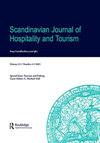人类世时代新兴的后北极旅游业:以芬兰拉普兰为例
IF 3.6
4区 管理学
Q2 HOSPITALITY, LEISURE, SPORT & TOURISM
Scandinavian Journal of Hospitality and Tourism
Pub Date : 2022-10-17
DOI:10.1080/15022250.2022.2134204
引用次数: 4
摘要
摘要气候变化经常被媒体视为迫在眉睫的世界末日,其对冰冻圈的影响在北极地区越来越明显。北极世界末日的未来与人类世的一系列叙事有关,在人类世,雪景、冰川和北极熊都消失了。这导致了一种名为“最后机会旅游”的趋势,这已成为旅游运营商和当地社区不断发展的经济机会。在这篇概念性文章中,我们提出了一个北极旅游业发展的替代愿景,称为“后北极旅游”。为了说明这一观点,我们在现有文献的基础上,以芬兰拉普兰(北极芬兰)为例。有人认为,如果过去和流传的北极霸权形象仍然停留在冰冻圈和传统的冬季想象中,那么后北极旅游业可能是基于所谓的黑暗旅游实践。这种情况得到了一个称为“Arcfication”的社会空间化过程的支持,该过程与保持冰冻层凝视的积极尝试有关。因此,至关重要的是,旅游企业、地区和依赖旅游业的社区要通过“去北极化”战略,重新思考和发明他们的北极叙事,让未来更加美好,让北极旅游业变得更加可持续和合乎道德。本文章由计算机程序翻译,如有差异,请以英文原文为准。
Emerging post-Arctic tourism in the age of Anthropocene: case Finnish Lapland
ABSTRACT Climate change is often considered as a looming apocalypse in the media and its impacts on the cryosphere are increasingly visible in the Arctic region. This apocalyptic future of the Arctic relates to a set of narratives associated with the Anthropocene, wherein snowy landscapes, glaciers and polar bears have disappeared. This has led to a trend called last chance tourism, which has become an evolving economic opportunity for tourism operators and local communities. In this conceptual article we propose an alternative vision for Arctic tourism development referred to as “post-Arctic tourism”. In order to illustrate the idea, we utilize Finnish Lapland (Arctic Finland) as an example based on existing literature. It is argued that post-Arctic tourism may be based on so-called dark tourism practices if the used and circulated hegemonic representations of the Arctic remain locked in cryospheric- and traditional winter-based imaginaries. This scenario is supported by a social spatialization process called “Arctification”, associated with active attempts to maintain the cryospheric gaze. It is therefore critical for tourism businesses, regions and tourism-dependent communities to rethink and re-invent their Arctic narratives, through “de-Arctification” strategies, allowing for a plurality of tomorrows and for Arctic tourism to become more sustainable and ethical.
求助全文
通过发布文献求助,成功后即可免费获取论文全文。
去求助
来源期刊
CiteScore
7.90
自引率
8.30%
发文量
14
期刊介绍:
Scandinavian Journal of Hospitality and Tourism is the leading Nordic journal for hospitality and tourism research. SJHT aims at initiating and stimulating high-impact and innovative research relevant for academics and practitioners within the hospitality and tourism industries. The journal takes an interdisciplinary approach including, but not limited to geography, psychology, sociology, history, anthropology, and economics. SJHT encourages research based on a variety of methods, including both qualitative and quantitative approaches. The journal covers all types of articles relevant to the Nordic region, as well as the North Atlantic, North Sea and Baltic regions. We also welcome reviews and conceptual articles with a broader geographical scope that clearly enhance the theoretical development of the hospitality and tourism field. In addition to research articles, we welcome research notes and book reviews. Published articles are the result of anonymous reviews by at least two referees chosen by the editors for their specialist knowledge.

 求助内容:
求助内容: 应助结果提醒方式:
应助结果提醒方式:


